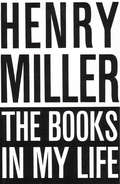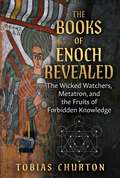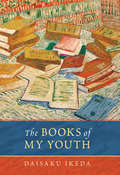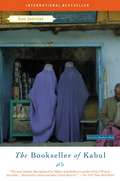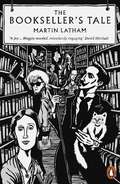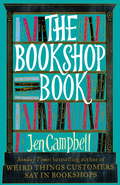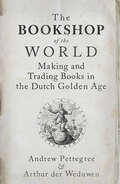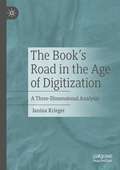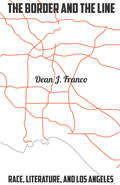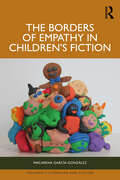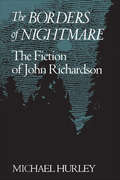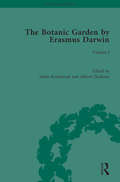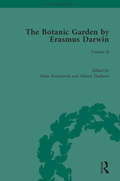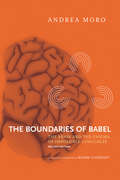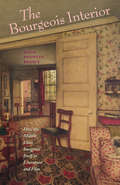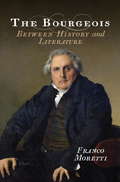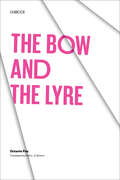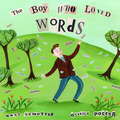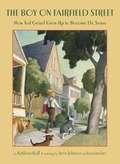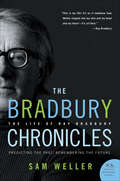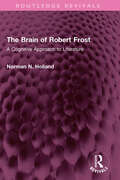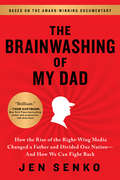- Table View
- List View
The Books in My Life
by Henry MillerIn this unique work, Henry Miller gives an utterly candid and self-revealing account of the reading he did during his formative years. Some writers attempt to conceal the literary influences which have shaped their thinking--but not Henry Miller. In The Books in My Life he shares the thrills of discovery that many kinds of books have brought to a keenly curious and questioning mind. Some of Miller's favorite writers are the giants whom most of us revere--authors such as Dostoeyvsky, Boccaccio, Walt Whitman, James Joyce, Thomas Mann, Lao-Tse. To them he brings fresh and penetrating insights. But many are lesser-known figures: Krishnamurti, the prophet-sage; the French contemporaries Blaise Cendrars and Jean Giono; Richard Jeffries, who wrote The Story of My Heart; the Welshman John Cowper Powys; and scores of others. The Books in My Life contains some fine autobiographical chapters, too. Miller describes his boyhood in Brooklyn, when he devoured the historical stories of G. A. Henty and the romances of Rider Haggard. He tells of the men and women whom he regards as "living books": Lou Jacobs, W. E. B. DuBois, Elizabeth Gurley Flynn, and others. He offers his reminiscences of the New York Theatre in the early 1900's--including plays such as Alias Jimmy Valentine and Nellie, the Beautiful Cloak Model. And finally, in Miller's best vein of humor, he provides a satiric chapter on bathroom reading. In an appendix, Miller lists the hundred books that have influenced him most.
The Books of Enoch Revealed: The Wicked Watchers, Metatron, and the Fruits of Forbidden Knowledge
by Tobias Churton• Examines in depth Enoch&’s full story of the Watchers, the fallen angels who came to Earth and shared corrupting forbidden knowledge• Explores how Enoch was a vital component of Second Temple messianic Judaism, speculative Jewish mysticism, the Kabbalah, and Gnostic mythology• Investigates the entire history of the Book of Enoch and its important esoteric offshoots, including the later 2 Enoch (the Slavonic &“Book of the Secrets of Enoch&”) and the so-called Hebrew &“Book of Enoch&” (3 Enoch)Said to have been written by the prophet Enoch, the great-grandfather of Noah, the Book of Enoch disappeared for many centuries, except for one place: the Bible of the Ethiopian Orthodox Church, which held the book as canonical.Revealing the profound influence of the Book of Enoch on world thought over the past two thousand years, Tobias Churton investigates the entire history of the Book of Enoch and its important esoteric offshoots, including the later 2 Enoch (the Slavonic "Book of the Secrets of Enoch") and the so-called Hebrew "Book of Enoch" (3 Enoch). He explains how Enoch was taken to Heaven where he received personal instruction from God and examines in depth Enoch&’s full story of the Watchers, the fallen angels who came to Earth and shared corrupting forbidden knowledge. He explains how the Book was a vital component of Second Temple messianic Judaism and speculative Jewish mysticism, playing a key role in the development of both the Kabbalah and Gnostic mythology.Informed by continuing studies of the Dead Sea Scrolls, Churton provides the first comprehensive examination of the Book of Enoch, clarifying and refuting many errors of understanding about Enoch&’s apocalyptic and sometimes sensational prophecies.
The Books of My Youth
by Daisaku IkedaDaisaku Ikeda's well-known passion for reading leaps from the pages of The Books of My Youth. This tour of world-class literature he read as a young man—books, he says, that helped form his life's "spiritual framework"—will delight and inspire.Here we meet heroes and heroines, revolutionaries and villains. We hear poets singing their praises of the human spirit. We engage with philosophers who challenge the status quo as they illuminate a new way forward.Come, thrill to the discovery of how great literature can inform and bolster our Buddhist practice to bring peace and justice to the world today.
The Bookseller of Kabul
by Asne Seierstad Ingrid ChristophersenAn unusually intimate glimpse of a typical Afghan family, gleaned from the author's 3-month stay with the bookseller's family. With a list of questions for reading groups.
The Bookseller's Tale
by Martin LathamA SPECTATOR AND EVENING STANDARD BOOK OF THE YEAR 2020'A joy. Each chapter instantly became my favourite' David Mitchell, author of Cloud Atlas'Wonderful' Lucy Mangan'The right book has a neverendingness, and so does the right bookshop.'This is the story of our love affair with books, whether we arrange them on our shelves, inhale their smell, scrawl in their margins or just curl up with them in bed. Taking us on a journey through comfort reads, street book stalls, mythical libraries, itinerant pedlars, radical pamphleteers, extraordinary bookshop customers and fanatical collectors, Canterbury bookseller Martin Latham uncovers the curious history of our book obsession - and his own. Part cultural history, part literary love letter and part reluctant memoir, this is the tale of one bookseller and many, many books.'If ferreting through bookshops is your idea of heaven, you'll get the same pleasure from this treasure trove of a book' Jake Kerridge, Sunday Express
The Bookshop Book
by Jen CampbellWe're not talking about rooms that are just full of books. We're talking about bookshops in barns, disused factories, converted churches and underground car parks. Bookshops on boats, on buses, and in old run-down train stations. Fold-out bookshops, undercover bookshops, this-is-the-best-place-I've-ever-been-to-bookshops. Meet Sarah and her Book Barge sailing across the sea to France; meet Sebastien, in Mongolia, who sells books to herders of the Altai mountains; meet the bookshop in Canada that's invented the world's first antiquarian book vending machine. And that's just the beginning. From the oldest bookshop in the world, to the smallest you could imagine, The Bookshop Book examines the history of books, talks to authors about their favourite places, and looks at over three hundred weirdly wonderful bookshops across six continents (sadly, we've yet to build a bookshop down in the South Pole). The Bookshop Book is a love letter to bookshops all around the world. --"A good bookshop is not just about selling books from shelves, but reaching out into the world and making a difference." David Almond (The Bookshop Book includes interviews and quotes from David Almond, Ian Rankin, Tracy Chevalier, Audrey Niffenegger, Jacqueline Wilson, Jeanette Winterson and many, many others.)
The Bookshop of the World: Making and Trading Books in the Dutch Golden Age
by Andrew Pettegree Arthur der WeduwenThe untold story of how the Dutch conquered the European book market and became the world’s greatest bibliophiles.The Dutch Golden Age has long been seen as the age of Rembrandt and Vermeer, whose paintings captured the public imagination and came to represent the marvel that was the Dutch Republic. Yet there is another, largely overlooked marvel in the Dutch world of the seventeenth century: books.In this fascinating account, Andrew Pettegree and Arthur der Weduwen show how the Dutch produced many more books than pictures and bought and owned more books per capita than any other part of Europe. Key innovations in marketing, book auctions, and newspaper advertising brought stability to a market where elsewhere publishers faced bankruptcy, and created a population uniquely well-informed and politically engaged. This book tells for the first time the remarkable story of the Dutch conquest of the European book world and shows the true extent to which these pious, prosperous, quarrelsome, and generous people were shaped by what they read.“Book history at its best.” —Robert Darnton, New York Review of Books“Compelling and impressive.” —THES (Book of the Week)“An instant classic on Dutch book history.” —BMGN - Low Countries Historical Review
The Bookstore Cat
by Cylin BusbyAn irresistible and engaging picture book perfect for story time, and for cat and bookstore lovers alike! The bookstore cat is an adorable . . . bossy . . . cuddly cat. He is everything from intelligent and loyal to naughty and vocal! But most of all, the bookstore cat is a well-loved (and well-read) kitty. Follow his funny antics from A to Z through a day in his bustling, book-filled shop. The Bookstore Cat is based on a Victorian parlor game, The Minister’s Cat, in which players try to think of adjectives to describe the cat in alphabetical order. Readers can extend the fun of the book by playing their own version of the game.
The Books’ Road in the Age of Digitization: A Three-Dimensional Analysis
by Janina KriegerAlthough every area of life is permeated by digital processes, the majority of Germans seem to resist digital alternatives with regard to the activity of reading. The printed book continues to enjoy much greater popularity than the eBook. This seems surprising, since the entire communication behavior has moved to digital devices. So what lies behind this? Why are there still printed books in digital times? Previous studies of the printed book have focused primarily on its media future, as this seemed threatened by digitization. In this work, Janina Krieger instead examines the past from three perspectives in order to gain insights into the present. While other studies always chose one method and these mostly belonged to the quantitative approach, here three subjects are identified, which are examined with different methods and in their combination can provide an answer to the research question: the consumers of literature (the readers), literature itself (the selected genre is the novel), and the media theories of the 20th century, which have already dealt with media change.
The Border and the Line: Race, Literature, and Los Angeles (Stanford Studies in Comparative Race and Ethnicity)
by Dean J. FrancoLos Angeles is a city of borders and lines, from the freeways that transect its neighborhoods to streets like Pico Boulevard that slash across the city from the ocean to the heart of downtown, creating both ethnic enclaves and pathways for interracial connection. Examining neighborhoods in east, south central, and west L.A.—and their imaginative representation by Chicana, African American, and Jewish American writers—this book investigates the moral and political implications of negotiating space. The Border and the Line takes up the central conceit of "the neighbor" to consider how the geography of racial identification and interracial encounters are represented and even made possible by literary language. Dean J. Franco probes how race is formed and transformed in literature and in everyday life, in the works of Helena María Viramontes, Paul Beatty, James Baldwin, and the writers of the Watts Writers Workshop. Exploring metaphor and metonymy, as well as economic and political circumstance, Franco identifies the potential for reconciliation in the figure of the neighbor, an identity that is grounded by geographical boundaries and which invites their crossing.
The Borders of Empathy in Children’s Fiction (Children's Literature and Culture)
by Macarena García-GonzálezThe Borders of Empathy in Children’s Fiction centres the question of how reading fiction develops our moral imagination and our capacities to think and feel with others. The question is approached with a good dose of scepticism, revising tensions between ethical, aesthetical, and pedagogical dimensions when certain books, films, and other cultural materials are recommended for children. This volume examines how texts addressed to children are meant to assist socioemotional education and whether we put forward adultist assumptions around such conceptualisations of the emotional. The book is organised into nine chapters, with some of them focusing on "difficult" themes —such as violence, xenophobia, death, migration, as well as gender and social exclusions— and some others on more general relationships between emotions, media, and education. The chapters combine a textual analysis of recommended cultural materials for children with insights from empirical research and ethnographic approaches to children’s cultures. A common thread throughout the book is the open question about the epistemic injustices in knowing children and childhood and how this may be overcome by shifting our research practices with posthumanist philosophies.
The Borders of Nightmare: The Fiction of John Richardson
by Michael HurleyJohn Richardson was Canada's first native-born poet-novelist and 'The Father of Canadian Literature.' Michael Hurley offers the first detailed account of Richardson's fiction rather than of his life or sociological importance. Hurley makes a convincing case for Richardson as an important early cartographer of the Canadian imagination and the originator of 'Southern Ontario Gothic.' He explores Richardson's influence on James Reaney, Alice Munro, Robertson Davies, Christopher Dewdney, Frank Davey, and Marian Engel. Arguing that Wacousta and The Canadian Brothers hold central places in our literature, Hurley shows how these two works established a set of boundaries that our national literary discourse has largely kept hidden. Focusing on the protean concept of the border in the fiction of this man from the periphery, The Borders of Nightmare underlines the importance of boundaries, margins, shifting edges, and the coincidence of equally matched opposites in necessary balance to both Richardson and subsequent writers. In an age of postmodernism these novels – riddled as they are with discontinuities, paradoxes, ambiguity, and unresolved dualities that problematize the whole notion of a stable, coherent national or personal identity – anticipate and define a number of concerns that preoccupy us today.
The Bossy Pig (Fountas & Pinnell LLI Green #Level G, Lesson 94)
by Marie BrownFountas and Pinnell Leveled Literacy Intervention Green System -- 1st Grade
The Botanic Garden by Erasmus Darwin: Volume I (The Pickering Masters)
by Adam KomisarukThe career of Erasmus Darwin (1731-1802) affords an extraordinary glimpse into the intellectual ferment of late-eighteenth- and early-nineteenth-century Britain. As a popular poet, practicing physician, inventor of speaking machines and mechanical birds, essayer of natural history from geology to meteorology, and proponent of an evolutionary theory that inspired his famous grandson Charles, he left a lasting impression on almost every branch of knowledge. His magnum opus, and the synthesis of his myriad interests, is The Botanic Garden (1792) — an epic poem that aims to "enlist the Imagination under the banner of Science." Part I, The Economy of Vegetation, sings the praises of British industry as a dance of supernatural creatures while part II, The Loves of the Plants, wittily employs metaphors of human courtship to describe the reproductive cycles of hundreds of flowers. Darwin supplements his accomplished verses with (often much longer) "philosophical notes" that offer his idiosyncratic perspective on the scholarly controversies of the day. Despite a recent surge of academic interest in Darwin, however, no authoritative critical edition of The Botanic Garden exists, presenting a barrier to further scholarship. This two volume set comprises a complete, meticulously transcribed, reading text — including all the poetry, prose apparatus, and illustrations — along with extensive commentary that situates Darwin within contemporary debates about the natural sciences. This set will be of interest to readers as the definitive reference edition of The Botanic Garden and due to its efforts to make the work more practically and intellectually accessible to seasoned and novice readers alike. The first volume presents a wide ranging and authoritative introduction to The Botanic Garden, detailing the background to the work and the various contexts in which it should be understood. These include: aesthetic theory and practice, the science of the mind, love and sexuality, politics, spirituality, the natural sciences, and evolutionary theory and the two Darwins. The full text of Part I of the The Botanic Garden, The Economy of Vegetation, then follows accompanied by the editors’ annotations, discussion of illustrations and textual notes.
The Botanic Garden by Erasmus Darwin: Volume II (The Pickering Masters)
by Adam KomisarukThe career of Erasmus Darwin (1731-1802) affords an extraordinary glimpse into the intellectual ferment of late-eighteenth- and early-nineteenth-century Britain. As a popular poet, practicing physician, inventor of speaking machines and mechanical birds, essayer of natural history from geology to meteorology, and proponent of an evolutionary theory that inspired his famous grandson Charles, he left a lasting impression on almost every branch of knowledge. His magnum opus, and the synthesis of his myriad interests, is The Botanic Garden (1792) — an epic poem that aims to "enlist the Imagination under the banner of Science." Part I, The Economy of Vegetation, sings the praises of British industry as a dance of supernatural creatures while part II, The Loves of the Plants, wittily employs metaphors of human courtship to describe the reproductive cycles of hundreds of flowers. Darwin supplements his accomplished verses with (often much longer) "philosophical notes" that offer his idiosyncratic perspective on the scholarly controversies of the day. Despite a recent surge of academic interest in Darwin, however, no authoritative critical edition of The Botanic Garden exists, presenting a barrier to further scholarship. This two volume set comprises a complete, meticulously transcribed, reading text — including all the poetry, prose apparatus, and illustrations — along with extensive commentary that situates Darwin within contemporary debates about the natural sciences. This set will be of interest to readers as the definitive reference edition of The Botanic Garden and due to its efforts to make the work more practically and intellectually accessible to seasoned and novice readers alike This second volume includes the full version of the second part of The Botanic Garden, The Lives of Plants along with the related textual apparatus consisting of the editors’ annotations, discussion of the illustrations, textual notes, and a taxonomic table of the flowers mentioned.
The Boundaries of Babel, second edition: The Brain and the Enigma of Impossible Languages (Current Studies in Linguistics #46)
by Andrea MoroThe new edition of a pioneering book that examines research at the intersection of contemporary theoretical linguistics and the cognitive neurosciences.In The Boundaries of Babel, Andrea Moro describes an encounter between two cultures: contemporary theoretical linguistics and the cognitive neurosciences. As a leading theoretical linguist in the generative tradition and also a neuroscientist, Moro is uniquely equipped to tell this story. Moro examines what he calls the “hidden” revolution in contemporary science: the discovery that the number of possible grammars is not infinite and that their number is biologically limited. This will require us to rethink not just the fundamentals of linguistics and neurosciences but also our view of the human mind. Moro searches for neurobiological correlates of “the boundaries of Babel”—the constraints on the apparent chaotic variation in human languages—by using an original experimental design based on artificial languages exploiting neuroimaging techniques. This second edition includes a new chapter in which Moro extends the exploration of the boundaries of Babel in search of the source of order with which all human languages are endowed. Reflecting on the emerging methodology that obtains physiological data from awake brain surgery, Moro shifts from considering where the neurophysiological processes underlying linguistic competence take place—that is, where neurons are activated—to considering the neuronal code involved in these processes—that is, what neurons communicate to each other. This edition also features a substantive new foreword by Noam Chomsky synthesizing the major issues theoretical syntax will face in the near future.
The Bourgeois Interior
by Julia Prewitt BrownFrom Robinson Crusoe's cave to Henry Selwyn's hermitage, the domestic interior tells a story about "things" and their relation to character and identity. Beginning with a description of a typical middle-class interior in America today--noting how its contents echo interiors described in literatures of the past--Julia Prewitt Brown asks why certain features persist, despite radical changes in domestic life over the past three hundred years. The answer lies, Brown argues, in the way the bourgeois interior functions as a medium, a many-layered fabric across which different energies travel, be they psychological, political, or aesthetic. In this way, objects are not symbols but rather the materials out of which symbols are made--symbols that constitute the very soul of the bourgeois. In a wide-ranging analysis, moving from works by Daniel Defoe, Jane Austen, Charles Dickens, and Henry James to those by Virginia Woolf, Ingmar Bergman, John Updike, and W. G. Sebald, Brown shows that what is at issue is less the economic basis of class than the bourgeoisie's imagination of itself. The themes explored include the middle class's ever-increasing desire for more wealth, as well as Victorian women's identification with the domestic interior and the changes that took place when they began working outside the home. Brown also examines the ambivalence of economically determined objects both as repositories of memory and dreams and as fetishized commodities that become detached from everyday reality. Does the bourgeois possess the interior and its objects, or do the interior and its objects possess the bourgeois?
The Bourgeois: Between History and Literature
by Franco Moretti"The bourgeois ... Not so long ago, this notion seemed indispensable to social analysis; these days, one might go years without hearing it mentioned. Capitalism is more powerful than ever, but its human embodiment seems to have vanished. 'I am a member of the bourgeois class, feel myself to be such, and have been brought up on its opinions and ideals,' wrote Max Weber, in 1895. Who could repeat these words today? Bourgeois 'opinions and ideals'--what are they?"Thus begins Franco Moretti's study of the bourgeois in modern European literature--a major new analysis of the once-dominant culture and its literary decline and fall. Moretti's gallery of individual portraits is entwined with the analysis of specific keywords--"useful" and "earnest," "efficiency," "influence," "comfort," "roba"--and of the formal mutations of the medium of prose. From the "working master" of the opening chapter, through the seriousness of nineteenth-century novels, the conservative hegemony of Victorian Britain, the "national malformations" of the Southern and Eastern periphery, and the radical self-critique of Ibsen's twelve-play cycle, the book charts the vicissitudes of bourgeois culture, exploring the causes for its historical weakness, and for its current irrelevance.
The Bow and the Lyre: The Poem, The Poetic Revelation, Poetry and History (Texas Pan American Series)
by Octavio PazOctavio Paz presents his sustained reflections on the poetic phenomenon and on the place of poetry in history and in our personal lives.
The Boy Who Loved Words
by Roni Schotter Giselle PotterIn this Parents' Choice Gold Award-winning book, Selig collects words, ones that stir his heart (Mama!) and ones that make him laugh (giggle). But what to do with so many luscious words? After helping a poet find the perfect words for his poem (lozenge, lemon, and licorice), he figures it out: His purpose is to spread the word to others. And so he begins to sprinkle, disburse, and broadcast them to people in need.
The Boy on Fairfield Street: How Ted Geisel Grew Up to Become Dr. Seuss
by Kathleen KrullIntroduces the life of renowned children's book author and illustrator Ted Geisel, popularly known as Dr. Seuss, focusing on his childhood and youth in Springfield, Massachusetts.
The Bradbury Chronicles: The Life of Ray Bradbury
by Sam Weller“For Bradbury fans, THE BRADBURY CHRONICLES is essential. . . . [A]n engaging, often fascinating tale.” — New York Times Book Review“A fascinating look at a man’s work -- and the incredible evolution of an alien subgenre.” — Chicago Tribune “A highly readable story . . . informative, enjoyable, and inspiring.” — School Library Journal
The Brain of Robert Frost: A Cognitive Approach to Literature (Routledge Revivals)
by Norman N. HollandOriginally published in 1988, this book brings brain science to literary criticism. The Brain of Robert Frost combines psychoanalysis with the findings of brain research and cognitive psychology to model the way we create and respond to literature. Norman Holland draws three central ideas from ‘the mind’s new science’: the critical ‘supercharged’ period in infancy when individuality is formed; the binding of emotion to intellect deep in the old brain; the top-down, inside-out, feedback processing of language in the new. Then, using Robert Frost as an example both of a writer and a reader, and comparing Frost’s reading of a poem to readings by six professors of literature, Holland builds a new, powerful way of thinking about literary criticism and teaching. A book about literary cognition, The Brain of Robert Frost furthers our understanding of the reading process, of poet’s brains, and of our own.
The Brainwashing of My Dad: How the Rise of the Right-Wing Media Changed a Father and Divided Our Nation—And How We Can Fight Back
by Jen SenkoAfter her beloved dad got addicted to right-wing talk radio and Fox News, Jen Senko feared he would never be the same again…Frank Senko had always known how to have a good time. Despite growing up in a poverty-stricken family during the Depression and having to fight his way to middle-class status as an adult, he tended to look on the bright side. But after a job change forced Frank to begin a long car commute every day, his daughter Jen noticed changes in his personality and beliefs. Long hours on the road listening to talk radio commentators like Rush Limbaugh sucked her father into a suspicion-laden worldview dominated by conspiracy theories, fake news, and rants about the "coastal elite" and "libtards" trying to destroy America.Over the course of a few years, Jen's dad went from a nonpolitical, open-minded Democrat to a radical, angry, and intolerant right-wing devotee who became a stranger to those closest to him. As politics began to take precedence over everything else in her father's life, Jen was mystified. What happened to her dad? Was there anything she could do to help? And, most importantly, would he ever be his lovable self again? Jen began the search for answers, and found them... as well stories from countless other families like her own.Based on the award-winning documentary, The Brainwashing of My Dad uncovers the alarming right-wing strategy to wield the media as a weapon against our very democracy. Jen's story shows us how Fox News and other ultra-conservative media outlets are reshaping the way millions of Americans view the world, and encourages us to fight back.
